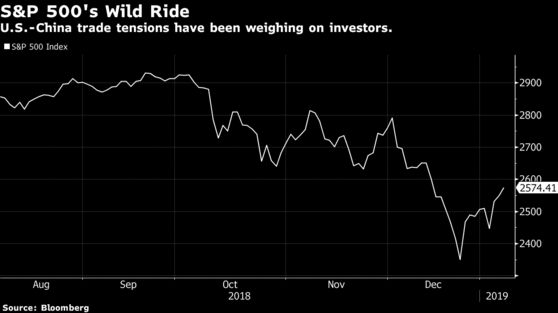President Donald Trump is increasingly eager to strike a deal with China soon in an effort to perk up financial markets that have slumped on concerns over the trade war, according to people familiar with internal White House deliberations.
Talks between mid-level U.S. and Chinese officials in Beijing concluded on Wednesday, and a Chinese foreign ministry spokesman said a positive result from the meetings will be good for the global economy. The negotiations had been extended for a day, which added to optimism fueled by tweets from Trump that the two sides are making progress toward an agreement.
Stocks gained from Europe to Asia, and U.S. futures rose, on fresh hope for a breakthrough in the showdown between the world’s two largest economies. China’s yuan rose to the strongest level in more than a month.

Xi Jinping
Photographer: Andrey Rudakov/Bloomberg
Inside the White House, some key economic advisers are campaigning for a quick resolution to the trade conflict to help soothe battered markets. The S&P 500 Index has fallen about 8 percent since Trump and Chinese President Xi Jinping agreed on a 90-day truce at a Dec. 1 meeting in Argentina.
“Talks with China are going very well!,” Trump tweeted on Tuesday, the latest in a series of upbeat messages from him on the negotiations since he met with Xi and the December market turmoil.
According to people familiar with the matter, Trump’s willingness to cut a deal with Beijing is driven in large part by his desire for markets to rally. He publicly said he’s eager to make a deal that benefits both sides while also stressing that China’s slowing economy and falling stock market signal the country is more desperate than the U.S. for a speedy outcome.

Still, talks have repeatedly yielded no breakthroughs since they started in May, and Beijing has repeatedly said it won’t cave to U.S. demands.
March Deadline
The press office of the U.S. Trade Representative declined to comment.
The two countries have until March 1 before U.S. tariffs on some $200 billion in Chinese goods are set to rise to 25 percent from 10 percent.
The president has focused on the stock market as it’s fallen over the past month as a gauge of success or failure, expressing frustration at the volatility, the people said.
China hawks in the administration have grown increasingly concerned about how the market turbulence has been affecting the president’s mood on trade. In public statements aides like Wilbur Ross, the commerce secretary, and Peter Navarro, a White House trade adviser, have played down the impact of the trade wars on markets, the U.S. economy and companies.
In private, some administration officials have confessed frustration in recent weeks with the market declines, appearing bemused by investors’ concerns over the China trade wars and how to address them.

From left, Steven Mnuchin, Wilbur Ross, Robert Lighthizer and Peter Navarro.
Photographer: Andrew Harrer/Bloomberg
Trade Abuses
But hawks have also been pressing the president to keep his focus on what they see as a long-term fight to address a vast list of Chinese trade abuses and make sure lasting changes in policy are both secured and can be enforced.
USTR’s Robert Lighthizer, who Trump appointed to lead the China talks, is pressing for the U.S. to take a harder line in the negotiations. He is pushing to address concerns of China’s alleged theft of intellectual property and market-access barriers, as well as to demand structural economic reforms.
Treasury officials have made the case that market volatility is in part due to the tightening of U.S. monetary policy, and a result of the trade war with China. Advocates of a quick deal with Beijing, including Treasury Secretary Steven Mnuchin and White House economic adviser Larry Kudlow, have used the markets jitters as a cudgel to press their case, the people said.
“We’re on our way to a deal. There is no question that the Chinese want the deal, they need the deal. Their economy is slowing much more than I think public data is showing right now,” Leland Miller, chief executive officer of China Beige Book, said on Bloomberg TV Tuesday. “There’s many in the White House who would like a longer fight, but for now the president has set the tone, and he says he wants a deal. So we’re on our way.”
— With assistance by Sharon Chen, Divya Balji, and James Mayger
No comments:
Post a Comment